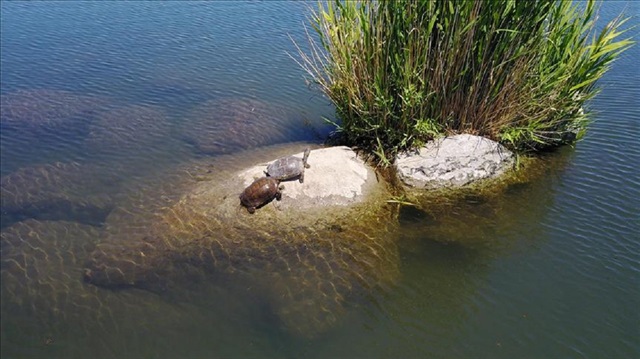
Karachi’s glistening beaches attract thousands of picnickers daily because of their shallow waters and sandy nature but they are also home to rare green turtles -- once the prime candidate for extinction.
Increasing water pollution and garbage scattered across the beach, decreasing natural habitats, and illegal trade have led to the dwindling number of the large salt-water species in recent decades. But, the latest studies show that the number of green turtles are actually on the rise in Pakistan.
Thanks to the combined efforts of the government agencies, and the wildlife non-governmental organizations (NGOs), which have brought 10 to 20 percent increase in the green turtles’ population in the last one decade.
“Our (latest) five-year study shows that the population of endangered green turtles is in fact increasing. There is no evidence to support a general perception regarding a decline in their population,” Muhammad Moazzam Khan, the technical adviser (marine fisheries) at the Karachi office of the World Wide Fund for Nature (WWF), told Anadolu Agency.
The WWF’s five-year study, according to Khan, puts the estimated offshore numbers of green turtles at around 8,000, which is considered a “healthy population” and 5 to 10 percent more than the previous figures.
Also, he added, the offshore population of Olive Ridley -- another species of marine turtles belonging to same group -- is also on the rise. The current estimated population of these turtles is nearly 28,000.
Fahmida Firdous, a Karachi-based wildlife expert, and a founding member of a government-sponsored project for conservation and protection of green turtles launched in 1980s, shares a similar view.
“The situation vis-à-vis population growth of green turtles is much better compared to the year when we launched the project”, Firdous, who did her doctorate on protection and conservation of marine turtles, told Anadolu Agency.
According to Firdous, a former conservator of the wildlife department of southern Sindh province, of which Karachi is the capital, there is an overall 20 percent increase in the large sea reptile’s population compared to their figures in 1980s.
Rasheed Agha, head of a Sindh government-owned center for conservation and protection of green turtles, said the center yearly released 900 green turtle hatchling into the Arabian Sea.
The female turtles lay their eggs on the beach between the months of October and February, which take 40 to 50 days to hatch, Agha added.
Khan gives an equal credit to the community, mainly fishermen for protection of the reptile.
- Still endangered
Weighing between 60 and 90 kilograms, green turtles use the Karachi’s famous Sandspit, and Hawksbay beaches as nesting grounds because of their sandy nature.
They are also found at some beaches of southwestern Balochistan province.
Despite a hopeful scenario in terms of population growth, experts see an increasing human activities on the beaches as a potential threat to the reptile -- the largest of the hard-shelled sea turtles.
“The danger is not over yet. It requires more attention and awareness regarding protection of this sea beauty,” Firdous warned, referring to growing water pollution, encroachment, concrete constructions, and trash, especially plastic bags left by picnickers.
“Plastic bags are killer for the reptile as if consumed it causes asphyxiation and eventually kill the reptile,” she observed.
“They (plastic bags) also hurdle the female turtles to dig pits for laying eggs,” she said.
She dubbed the protected species as a “gift from nature” as it massively adds to the protection of marine life by feeding on harmful algae.
“Green turtles are the beauty of our seas. If they disappear, there will be an unimaginable growth of algae, which will destroy the marine life,” she added.
Khan agrees with Firdous.
“The species is still considered endangered because it is slaughtered for meat and skin in several countries. But not in Pakistan,” he observed.
Rising sea levels due to climate change, Khan opined, was another threat because it was occupying the breeding grounds for the reptile.
- Illegal trade
Even as the large sea specie reptile has a status of an endangered species in accordance with the country’s wildlife laws, its trade and export are continuing unabated.
According to International Union for Conservation of Nature (IUCN), not only in Pakistan but the export of green turtles or its eggs is strictly prohibited worldwide due to endangered species status.
But, in Pakistan, one can not only buy the protected species or its eggs from the open market but online as well. Several websites offer deals on purchase of baby turtles.
Also, they are hunted for their meat, eggs, shells and skin.
A large number of turtles get entrapped in fishing nets in the offshore waters, which are later sold out in the local market or online.


